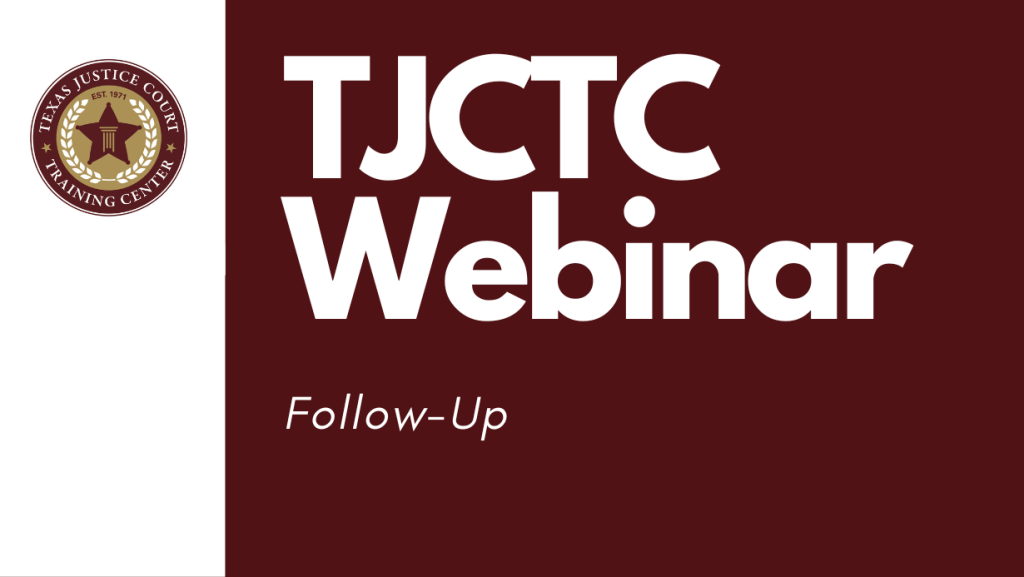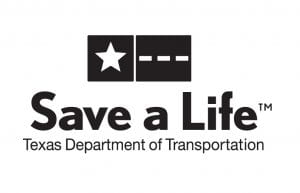
Hello Judges, Constables, and Court Staff,
We have several important updates for you, including some recent caselaw updates. Please make sure you read the full email.
SB 4 Update
There have been a few more rulings on SB 4, but the current state of the law is still that S.B. 4 is not in effect. We will keep you updated if anything changes.
In the meantime, TJCTC resources have been updated to reflect the impact of SB 4 on justice courts in the event that it goes into effect.
The Magistration Deskbook has been updated. See page 60-61 for updates related to SB 4.
U.S. Supreme Court Issues Opinion Related to Social Media and Liability for Public Officials
You may need to talk to your county attorney about what steps you need to take to ensure that your private social media accounts don’t open you up to potential liability.
In Lindke v. Freed, the U.S. Supreme Court unanimously held that a public servant who:
- had actual authority to speak on behalf of the State on a particular matter, and
- purported to exercise that authority
could open themselves to potential liability if they block people from seeing their posts from their private accounts on social media.
The example they give is a mayor officially announcing on his personal Facebook page that he is using his authority under a local ordinance to suspend enforcement of certain parking rules. If that were the case, the mayor would be unable to block citizens from access to his personal Facebook page.
The Court gives an example that might be worth following:
Had official’s account carried a label (example: “this is the personal page of [insert official’s name]”) or a disclaimer (example: “the views expressed are strictly my own”), the official would be entitled to a heavy (though not irrebuttable) presumption that all of the posts on their page were personal and not in their official capacity.
It’s probably time to edit your personal pages to make sure that this language is there.
The Court also states “an official who uses his staff to make a post will be hard pressed to deny that he was conducting government business.”
It is a best practice to keep your personal social media accounts and official social media accounts separate and not ask any employees to post or maintain your personal accounts.
The Court is very clear that a public official can have private speech and can limit who receives that private speech. There are going to be “hard-to-classify cases,” so you will need to talk to your county attorney about any advice or policies they may put into practice in your county.
Texas Court of Criminal Appeals (CCA) Rules that Refusal of Consent to Search NOT an Indication of Criminal Activity
Lall v. State is a straightforward opinion from the CCA that holds that a defendant’s lawful refusal to consent to a search cannot be considered in making a determination of probable cause or reasonable suspicion. This decision is consistent with how courts have treated a defendant’s assertion of other constitutional rights, like when a person invokes their Fifth Amendment right to remain silent as not being admissible as evidence of guilt.
State Bar Justice Court Section Webinar
The State of Debt Collection in Justice Courts, 1 hr
According to a 2018 Federal Reserve report, there were 59.5 Billion debit or credit card swipes a year in the United States. That boils down to 165 million swipes/day; approximately 15% of which occur in Texas (25 million/day; 1.8 million/hour; 30,000/minute; 500/sec). That’s a lot of plastic. Since then, things have only increased. This course will look at trends in the consumer debt arena both in terms of activity and evolving debt types and will review how these claims ultimately arrive and are presented to the courts. Topics will include digital documentation and an orientation to “fin-tech” debt.
Additionally, with increased activity comes increased scrutiny. This course will explore both the operational focus of the Consumer Financial Protection Bureau and the current regulatory environment, including the Fair Debt Practices Act and the more recently enacted Reg. F. Included will be a discussion of the Model Validation Notice, the limitations on contact activity and methods of communication, as well as the opportunities presented by the utilization of digital platforms.
Speaker: Michael Scott
April 12, 2024 at 12:00 PM CDT
Zoom Registration: https://us06web.zoom.us/meeting/register/tZEkfuGrrTIpEtNHsq828Gj7GumB9calOPk0%20#/registration
NCSC Webinars and Programs
Tiny Chats
Do you watch the NCSC Tiny Chats? They are short videos on topics related to court procedures and increasing fairness and confidence in the courts. The most recent Tiny Chat is about chat bots and how they can be helpful to court websites. Also, NCSC is partnering with Law Droid to build a lucky court a chat bot for free.
Highlights in Fines and Fees Reform
Later this week, watch our own Texas Supreme Court Chief Justice, Nathan Hecht, as he moderates a discussion about how several states are updating how they handle fines and fees.
Registration Link: https://ncsc-org.zoom.us/webinar/register/WN_YV04G9GPRdu8EAOOo9hkMg?utm_campaign=486477_Whats%20on%20April%201%202024&utm_medium=email&utm_source=dotdigital&dm_i=7L57,AFD9,4VW08I,1IB0V,1#/registration
April is Retiring
Our wonderful Office Coordinator April Williams is retiring at the end of April. If you have any well-wishes you would like to pass along, please email Jessica at jessforeman@txstate.edu.
We hope the month of April is kicking off to a great start in your courts and offices!
Thea & the TJCTC Team






